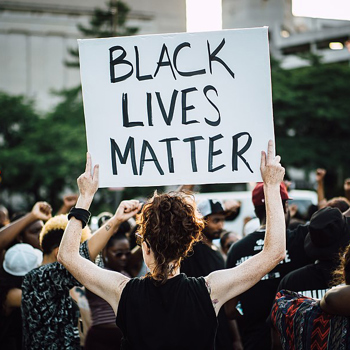Marking two years since the death of George Floyd
25/05/2022

Two years ago, we all witnessed the brutal murder of George Floyd by a US police officer, which propelled a powerful anti-racist protest movement in the US and across the globe. To mark this anniversary, Rethink Mental Illness' Peter Alleyne (Associate Director for Diversity, Equity, Inclusion and Race Equality) and Nisa Chisipochinyi (Head of Equity and Racial Justice) reflect on the last two years and discuss our progress towards becoming an anti-racist organisation.
For people from racially diverse backgrounds, these incidents are not new. They cut across all areas of life and aroused feelings of trauma, anger and exhaustion. What also came from this was the popularisation of terms like white fragility, unconscious bias and privilege. In this hotpot of topics, emotion and collective exploration, diverse organisations (public, private and third sector) have all been leaning into race equality through dialogue and investment for change in tackling structural racism in their workplaces and society. During the height of a global pandemic, the murder of George Floyd unified us all as people in calling us to attention in a way that we simply could not ignore or postpone.
We have long known about previous and well-publicised deaths of Black people at the hands of the law enforcement in the US. Eric Garner who was choked to death in 2014, while lying face down on the pavement, saying “I can’t breathe”; Ahmaud Arbery, a young Black man who was murdered during a racially motivated hate crime in 2020 and, more recently, the killing of 10 Black people by a white supremacist in Buffalo, New York in a supermarket. And, here in the UK, we can cite the cases of Stephen Lawrence; Sean Rigg, who had paranoid schizophrenia and died following a cardiac arrest while in police custody and Dalian Atkinson, the former professional footballer who was tasered and kicked in the head by a police officer (subsequently convicted of manslaughter) and died of cardiac arrest.
The result of these incidents has been protests, dialogue, promises and policy changes. This is where we find ourselves today, with good people from all backgrounds, actively embracing the dominant theme of the anti-racist movement, that: it is not enough to be not racist; we need to be anti-racist. This tells us that, no matter what race you are, we must all be involved in the fight against racism and pursue race equality; being an upstander by doing our best to support and protect our fellow human beings, regardless of the colour of their skin and not being a bystander or someone who walks over to the other side in the face of racial injustice. It means speaking up, advocating and questioning in the spaces in which we find ourselves - whether people from diverse backgrounds are present or not. We must all roll up our sleeves and get involved and be on the right side in this difficult struggle for racial justice and equality.
Here at Rethink Mental Illness, we are aspiring to be a charity who serves and is comprised of diverse people in a way that celebrates, embraces and is reflective of modern Britain. We are taking driven steps to be an anti-racist employer, campaigning organisation and service provider. We have been reflecting on what we need to do and have been talking, listening and moving into action in co-production with our Black, Asian and minority ethnic staff across the charity. As a result, we are more informed and better understand what we want to do; how we want to do it and when we want to do things, so that we are making a difference to the lived experience of our Black, Asian and minority ethnic colleagues and beneficiaries. With the support of our CEO Mark Winstanley and our Deputy CEO Brian Dow and diverse colleagues, we are using our professional expertise and passion along with an unrelenting focus to build a sustainable anti-racist ecosystem at Rethink Mental Illness.
So today, two years on from the murder of George Floyd, do take a moment to reflect on where we are now and what more we all need to keep doing to dismantle structural racism and shift the dial in favour of racial justice and equality.
Image: John Lucia, CC BY 2.0 via Wikimedia Commons. https://commons.wikimedia.org/wiki/File:Black_Lives_Matter.jpg
